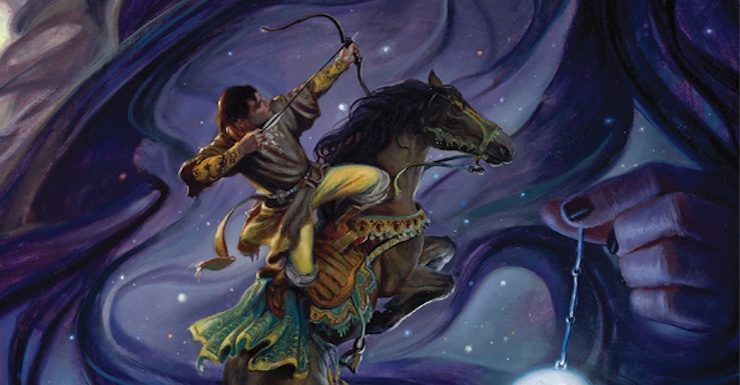Welcome to the Tor.com eBook Club! October’s pick is Range of Ghosts, the first book in the Eternal Sky trilogy. You have until Sunday, October 9th to get your FREE ebook copy—but first, here’s what makes this epic fantasy series stand out from the pack!
I said once—probably more than once, actually, but at least once where it’s written down—that Elizabeth Bear’s Range of Ghosts was the epic fantasy I’d been waiting my whole life to read. And never knew that I’d spent my whole life lacking it until I read it at long last.
The epic fantasy I grew up reading was Raymond E. Feist and Robert Jordan, Janny Wurts and Star Wars tie-ins (I account them epic fantasy, by style), Stephen Donaldson (I wince to look back on my desperation) and Terry Goodkind (who did have female characters, which when I was thirteen made up for a number of his other flaws). When I say grew up reading, I mean that period between age eleven and age fifteen, or thereabouts: the period during which I formed a lot of my impressions, conscious and subconscious, of what epic fantasy was and what it could be. At the time, I didn’t have reliable (or, until I was fourteen, any) access to the internet, and Irish bookshops didn’t exactly stock a vast range of SFF genre fiction. The epic fantasy I read in those days, though I only realise it now I look back, left me oddly unsatisfied: left me with an itch that needed scratching. So I kept looking for the next author, the next book, the next thing that would finally, finally scratch that itch.
As I grew older and found my way into a community of readers, I read more widely. Gradually, I came across books that showed wider and more complex worlds. The itch got closer to being scratched.
And then, Range of Ghosts.
Its worldbuilding draws its inspiration from Central Asian history. The kingdoms and cities of the Central Asian steppe verge were for several centuries the richest, most intellectually vibrant, most accomplished collection of polities anywhere in the globe. The Silk Road facilitated cultural and mercantile exchange from Baghdad to the Jade Gate near Dunhuang in what is today the Gansu province of the People’s Republic of China. And Range of Ghosts reflects this richness, the ebb and flow of competing empires that leave change and destruction and sometimes reinvention in their wake.
Epic fantasy runs to culturally static landscapes, as a whole. Change is often cast as dissolution and decay from a more perfect past, or as the result of invasion by some evil force. The genre rarely looks realistically at the exchange and accommodation, interchange and appropriation, the interpermeability, that takes place at the margins of empires and in their interstices: it rarely foregrounds change as an inevitability, and a thing that is in itself morally neutral. It rarely foregrounds variety, either in its cultures or in its characters.
But change and exchange is central to Range of Ghosts and indeed to the whole Eternal Sky trilogy, even beyond the familiar epic story that lies underneath its bones. (A young man coming of age, pushed to reclaim his birthright: the bones of it is a story we know in our gut.) But in the Eternal Sky trilogy, Bear’s characters cross landscapes that differ significantly in culture, in geography, and in the theology that’s reflected in their skies.
The heavenly aspect to Range of Ghosts is one of the things that really highlights the vastness and the strangeness of the book’s world. As well the variety of cultures through and around which the protagonists—themselves a diverse bunch—must navigate.
I’m particularly fond of Hrahima, the tiger-woman Cho-tse. And of Samarkar, a woman of mature years, once-princess, now a wizard, who traded her womb in surgery for the chance of a power that could belong to her alone—not her father’s, or her brother’s. And of Edene, a young woman kidnapped and entrapped, who ends the novel seizing the (tainted) power set in front of her: her fate and her choices are to become vitally important over the course of the trilogy.
The scope here—the scope for people, of so many different kinds and with so many different agendas, with competing needs and drives; the scale of the landscape, of the struggles—takes me aback, always. Every time I reread Range of Ghosts, the way in which Bear treats the human, intimate struggles of her characters with the same attention to detail and the same care as the epic struggle of politics and kingdoms and competing theologies… it draws me in and holds me rapt, without fail. Because those things are interlinked: kingdoms and empires are made of people, after all.
Complicated people. People with loyalties pulled differed ways. People who need to choose the least terrible option.
There’s something about Range of Ghosts that just… I run out of words. It means too much to me, in its depth and its compassion, its rejection both of the utopian and the dystopian in favour of the human.
Its characters are vastly more diverse and vastly more complex people than those of the epic fantasies that I first encountered. It feels like coming home and like a door opened on a universe of possibilities all at one—and the trilogy as a whole cut my heart out of my chest.
And put it back, changed.
Top image: Range of Ghosts cover art by Donato Giancola.
Liz Bourke is a cranky person who reads books. She holds a Ph.D in Classics from Trinity College, Dublin. Find her at her blog. Or her Twitter.










